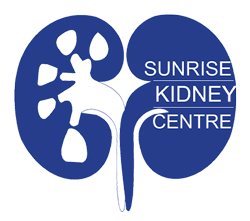Kidney Stones Treatment in Vijayawada
Kidney stones are hard mineral and salt deposits that form in the kidneys, resulting from various factors including diet, dehydration, and certain medical conditions. These small, solid masses can vary in size and may remain in the kidney or travel down the urinary tract, causing significant pain and discomfort. Symptoms typically include severe pain in the back or side, blood in the urine, nausea, and frequent urination. Diagnosis by Kidney stone specialist in Vijayawada is usually achieved through imaging tests such as ultrasound or CT scans, while treatment options range from increased fluid intake and dietary changes to medications and, in some cases, surgical procedures like lithotripsy, which breaks up larger stones. Preventive measures involve staying well-hydrated, modifying dietary habits, and managing underlying health issues that may contribute to stone formation. Recognizing the early signs of stones for Kidney Stones Treatment in Vijayawada is crucial to mitigate pain and prevent complications, making education and awareness about this condition essential.
What can cause kidney stones?

Kidney stones form due to a combination of factors that disrupt the balance of substances in the urine. One primary cause is dehydration, leading to concentrated urine, which facilitates the crystallization of minerals and salts. Kidney specialist in Vijayawada also say that dietary factors also play a significant role; high intake of oxalate-rich foods (like spinach and nuts), excessive sodium, and inadequate calcium can contribute to stone formation. Metabolic disorders, such as hyperparathyroidism, can increase calcium levels, while conditions like gout can raise uric acid, both of which can lead to different stone types. Obesity and certain medications may also elevate stone risk by altering how the body processes certain substances. Family history can predispose individuals to stones due to genetic factors influencing metabolic or dietary habits. Additionally, urinary tract infections (UTIs) can contribute to struvite stones, as bacteria change urine composition.
Symptoms of kidney stones:
- • Severe Pain: Sudden, sharp pain typically located on one side of the back or abdomen, often described as a renal colic.
- • Radiating Pain: Pain may extend to the groin, lower abdomen, or genitals.
- • Blood in Urine: Hematuria, or blood in the urine, can be noticeable as pink, red, or brown discoloration.
- • Frequent Urination: Increased urge to urinate or a frequent need to go to the bathroom.
- • Burning Sensation: Pain or a burning feeling during urination.
- • Nausea and Vomiting: These digestive symptoms may accompany the pain.
- • Cloudy or Foul-Smelling Urine: Changes in urine appearance or odor can indicate infection or stone presence.
- • Inability to Pass Urine: In severe cases, there may be a complete blockage, causing difficulty in urination.
- • Chills and Fever: If a kidney stone leads to an infection, fever and chills may develop.
Prevention of kidney stones:
Preventing kidney stones needs a discipline of diet and lifestyle changes. Staying well-hydrated is crucial; drinking plenty of water helps dilute substances that can form stones. Aiming for at least 2 to 3 liters of fluids daily can significantly reduce risk. Dietary modifications are also important as per Dr. M.V. Sai Krishna , reducing sodium intake can lower the amount of calcium in urine, while limiting oxalate-rich foods (like spinach, nuts, and chocolate) may help those prone to calcium oxalate stones. Increasing dietary calcium from sources like dairy can paradoxically help, as it binds to oxalate in the intestines. A balanced diet rich in fruits and vegetables provides necessary nutrients while reducing the risk of stone formation. Additionally, maintaining a healthy body weight and engaging in regular physical activity can decrease stone risk. For those with specific conditions contributing to stone formation, such as hyperparathyroidism or gout, managing these underlying issues is essential. Lastly, consulting with a healthcare provider for tailored advice and potential medication can further aid in prevention. By implementing these strategies, individuals can significantly lower their risk of developing kidney stones.
Treatment options from kidney stones:
Treatment options at Sunrise Kidney Centre for kidney stones primarily depend on the stone's size, type, and location, as well as the patient's overall health. For small stones (typically less than 5 mm), conservative management with increased fluid intake can help facilitate natural passage. Pain management with NSAIDs or opioids may be prescribed to alleviate discomfort during this process. If the stones are larger or causing complications, various medical interventions may be required. Ureteroscopy, a minimally invasive procedure, involves the use of a thin tube to retrieve or break down the stone. Shock wave lithotripsy uses high-energy sound waves to fragment stones into smaller pieces, allowing easier passage. In cases where stones are too large or obstructing urine flow, percutaneous nephrolithotomy may be performed, which involves a small incision in the back to remove the stone directly. Additionally, medications like alpha-blockers can help relax the muscles in the ureter, facilitating stone passage. Dietary changes and lifestyle modifications may also be suggested to prevent recurrence, focusing on hydration, dietary restrictions, and supplementary medications based on the stone's composition. Overall, a tailored approach ensures that patients receive the most effective treatment for their specific condition.
Lets look into few frequently asked questions with respect to kidney stones :
How do kidney stones form?
Kidney stones form when there is a concentration of minerals in the urine, such as calcium, oxalate, or uric acid.
Can I prevent kidney stones?
Yes, there are several steps you can take to reduce your risk of developing kidney stones:
- Drink plenty of water: Aim to drink at least 8-10 glasses of water per day.
- Follow a healthy diet: Avoid foods that are high in oxalate, calcium, and sodium.
- Limit animal protein: Limiting animal protein intake may help reduce the risk of kidney stone formation.
How long does it take for a kidney stone to pass?
The time it takes for a kidney stone to pass can vary depending on the size and location of the stone. Small stones may pass in a few days, while larger stones may take several weeks.
Can I prevent recurring kidney stones?
Yes, there are several steps you can take to reduce your risk of developing recurring kidney stones:
- Follow a healthy diet: Avoid foods that are high in oxalate, calcium, and sodium.
- Drink plenty of water: Aim to drink at least 8-10 glasses of water per day.
- Limit animal protein: Limiting animal protein intake may help reduce the risk of recurring kidney stone formation.
Can I have children with kidney stones?
Yes, it is possible to have children with kidney stones. However, it is important to take steps to prevent recurrence and reduce the risk of complications.
Are there any complications associated with kidney stones?
Yes, there are several complications that can occur if left untreated or if treatment is delayed. These complications may include:
- Infection
- Kidney damage
- Blockage of the urinary tract
- Blood clots
- Chronic kidney disease

